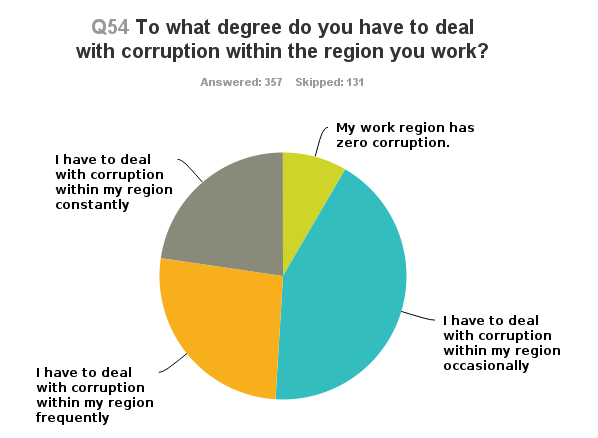Cancer of corruption or the culture of corruption?
How can we define, discuss and analyze this social phenomena? I will agree completely with the many who will point out that corruption is impossible to definitively operationalize and that cultural context, history, point of perspective, motivation, etc. are all factors. In fact I’ll argue that the term itself is a semantic land mine charged with power/Western-centric thinking.
So, what has appeared on the survey so far related to corruption?
There are three questions related to corruption on the survey, one about corruption in the organization of the respondent, one about corruption in the region where the respondent functions and then an open ended question encouraging elaboration on the closed ended question, namely what are your thoughts on corruption in general. I have tweeted a couple of the more pithy responses, but here are a few more to get our conversational juices flowing. For this post I have cherry-picked the ones below to make a few points.
First, there are some who report having seen little corruption:
- I have heard of one or two instances of corruption.
- It is rare and handled quickly.
And then there’s the more hard-nosed [realistic] voices:
- It’s part and parcel of this line of work, particularly with contractors, suppliers, and national staff (logistics staff). Cannot be avoided no matter what people say or claim.
- I work for the UN where unethical behavior is a constant.
- Local corruption and corruption in other agencies, especially the UN.
- Most recent region, little corruption, before that, daily occurrence, like the sun coming out in the morning.
- Corruption is very common in Afghanistan and I don’t think any organization is immune against this issue.
- Somalia. That is all.
- Corruption is a way of life here and most of the local authorities see it very differently than in the West. national staff get a lot of family pressure and struggle to explain how things are done differently.
There were several that were both critical and insightful at the same time. Here’s my favorite:
- Number one: this is another absurdly poorly worded question (are you a 19 year old undergrad? Seriously, where are your qualitative research skills?) What do you mean by “corruption within the organization”… are you talking about siphoning of donor funds for private use? Are you talking about organizations having to pay “tea money” to get project approval? Are you talking about employees stealing from the office? Seriously. For the second question, I work in governance and civil society strengthening in one of Asia’s most corrupt countries. Yes, dealing with corruption is a fact of life for us here. In fact, reducing corruption and pushing for transparency is one of our main objectives.
There were the philosophical and thought provoking:
- One man’s corruption is another man’s wealth redistribution system. I find it hard to judge others on this.
- Corruption is the biggest cause of poverty. If you are in aid, you deal with corruption.
The pointedly “culture of corruption” voices:
- Corruption is a way of life here and most of the local authorities see it very differently than in the West. national staff get a lot of family pressure and struggle to explain how things are done differently.
- Most of the corruption I deal with is not considered corruption by national standards, it is just a cultural norm. You look after yourself and those close to you first, and of course you have to pay a “facilitation fee” to get anything done.
And finally the “let’s look at this in a larger power-questioning context:
- Corruption exists everywhere -and the biggest $ corruption over the years has been in the ‘first world’ banking/investment sectors. It is perhaps more obvious day-to-day in other places – but exists everywhere.
- Four out of the last seven governors of Illinois have been charged with crimes related to corruption. It is a constant presence in all fields, aid work and otherwise.
- Corruption is a problem everywhere. Worst corruption and influence peddaling is in my home country, the US. It bothers me that people complain so much about corruption in the developing world when it is literally magnitudes greater in the US political system.
At the end of the day I will support the argument that there is much to consider when beginning to look deeply into this concept of corruption. I am reminded of a comment by Antonio Donini: “Humanitarianism started off as a powerful discourse; now it is a discourse of power, both at the international and at the community level.” I think part of the power the West wields is the power to drive the narrative in a self-serving manner and, in the case of corruption, perhaps not looking in the mirror long enough. I also think that this is a conversation worth having often, in depth, with passion and with concrete out-come oriented action as its goal.
What say you?
Here are the results of the question related to corruption within the region:



 Follow
Follow